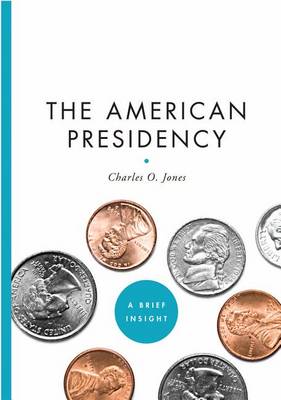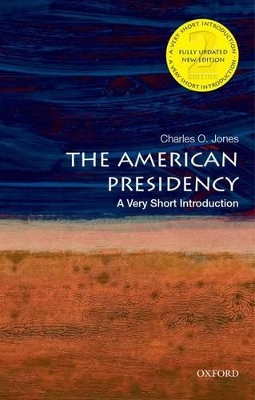Very Short Introductions
2 total works
The expansion of executive powers amid the war on terrorism has brought the presidency to the center of heated public debate. Now, in The American Presidency, presidential authority Charles O. Jones provides invaluable background to the current controversy, in a compact, reliable guide to the office of the chief executive. This marvelously concise survey is packed with information about the presidency, some of it quite surprising. We learn, for example, that the Founders adopted the word "president" over "governor" and other alternatives because it suggested a light hand, as in one who presides, rather than rules. Indeed, the Constitutional Convention first agreed to a weak chief executive elected by congress for one seven-year term, later calling for independent election and separation of powers.
Jones sheds much light on how assertive leaders, such as Andrew Jackson, Theodore Roosevelt, and FDR enhanced the power of the presidency, and illuminating how such factors as philosophy (Reagan's anti-Communist conservatism), the legacy of previous presidencies (Jimmy Carter following Watergate), relations with Congress, and the impact of outside events have all influenced presidential authority. He also explores the rise of federal power and the dramatic expansion of federal agencies, showing how the president takes a direct hand in this vast bureaucracy, and he examines the political process of selecting presidents, from the days of deadlocked conventions to the rise of the primary after World War II. "In 200 years," he writes, "the presidency had changed from that of a person-Washington followed by Adams, then Jefferson-to a presidential enterprise with a cast of thousands." Jones explains how this remarkable expansion has occurred and where it may lead in the future. ABOUT THE SERIES: The Very Short Introductions series from Oxford University Press contains hundreds of titles in almost every subject area.
These pocket-sized books are the perfect way to get ahead in a new subject quickly. Our expert authors combine facts, analysis, perspective, new ideas, and enthusiasm to make interesting and challenging topics highly readable.
Jones sheds much light on how assertive leaders, such as Andrew Jackson, Theodore Roosevelt, and FDR enhanced the power of the presidency, and illuminating how such factors as philosophy (Reagan's anti-Communist conservatism), the legacy of previous presidencies (Jimmy Carter following Watergate), relations with Congress, and the impact of outside events have all influenced presidential authority. He also explores the rise of federal power and the dramatic expansion of federal agencies, showing how the president takes a direct hand in this vast bureaucracy, and he examines the political process of selecting presidents, from the days of deadlocked conventions to the rise of the primary after World War II. "In 200 years," he writes, "the presidency had changed from that of a person-Washington followed by Adams, then Jefferson-to a presidential enterprise with a cast of thousands." Jones explains how this remarkable expansion has occurred and where it may lead in the future. ABOUT THE SERIES: The Very Short Introductions series from Oxford University Press contains hundreds of titles in almost every subject area.
These pocket-sized books are the perfect way to get ahead in a new subject quickly. Our expert authors combine facts, analysis, perspective, new ideas, and enthusiasm to make interesting and challenging topics highly readable.
The American founding fathers were dedicated to the project of creating a government both functional and incapable of devolving into tyranny. To do this, they intentionally decentralized decision making among the legislative, executive, and judiciary branches. They believed this separation of powers would force compromise and achieve their goal of "separating to unify." In the second edition of this Very Short Introduction, Charles O. Jones delves into the
constitutional roots of the American presidency to show how presidents faced the challenges of governing within a system of separation of powers.
This updated edition of The American Presidency reviews crucial themes, including democratization of presidential elections, transitioning into and organizing a presidency, challenges in leading the permanent government, making law and policy, and reforming and changing the institution. It also introduces new case studies from the Obama administration, providing compelling insights into contemporary critical issues such as military power, the role of the First Lady, and the new trends
in electoral campaigning-including the stunning advances in mass media and campaign technology.
Jones lucidly shows that American presidents are not, and simply cannot be, as powerful as most Americans believe them to be. Accordingly, he stresses the necessity to acknowledge the president's political status and style within the constitutional structure: the president is not the presidency, and the presidency is not the government.
constitutional roots of the American presidency to show how presidents faced the challenges of governing within a system of separation of powers.
This updated edition of The American Presidency reviews crucial themes, including democratization of presidential elections, transitioning into and organizing a presidency, challenges in leading the permanent government, making law and policy, and reforming and changing the institution. It also introduces new case studies from the Obama administration, providing compelling insights into contemporary critical issues such as military power, the role of the First Lady, and the new trends
in electoral campaigning-including the stunning advances in mass media and campaign technology.
Jones lucidly shows that American presidents are not, and simply cannot be, as powerful as most Americans believe them to be. Accordingly, he stresses the necessity to acknowledge the president's political status and style within the constitutional structure: the president is not the presidency, and the presidency is not the government.

